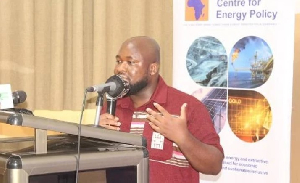Policy Lead for Petroleum and Conventional Energy at the Africa Centre for Energy Policy (ACEP), Kodzo Yaotse, has warned of the growing financial burden posed by Ghana’s legacy debt to Independent Power Producers (IPPs), which threatens the stability of the country’s power sector.
Speaking at a media capacity-building workshop in Kumasi, Yaotse detailed how accumulated debts, poor revenue collection, and inadequate policy interventions are leading Ghana toward a potential energy crisis.
Ghana owes IPPs over $1.2 billion, a figure that has been accumulating over time and is now referred to as “legacy debt.”
Despite government attempts to negotiate haircuts on these debts, IPPs remain steadfast in their demands for full payment, arguing that they have delivered power that has been consumed, yet they are not receiving the corresponding payments.
“The IPPs have been adamant. They produce power, the power is consumed, so why aren’t they being paid for it?” Yaotse asked, stressing the urgency of resolving this debt issue.
He likened the situation to Ghana’s challenges with external creditors like China, noting that both debtors face pressure to concede but are unwilling to bear losses on projects already delivered.
Another critical issue raised by Yaotse was Ghana’s debt to the Offshore Cape Three Points (OCTP) gas project, amounting to $450 million.
OCTP supplies 55% of the country’s domestic gas used for power generation, making it a crucial resource for Ghana’s energy security. The debt is backed by letters of credit, and failure to pay has led OCTP to draw down on these guarantees, further eroding the country’s financial standing.
“We were almost at the brink of triggering the World Bank guarantee last year because there was no money left in the security fund. If we had defaulted, Ghana would have joined countries like Argentina and Venezuela as defaulters,” Yaotse explained.
The government managed to avoid this by injecting $100 million into the fund, but the situation remains precarious.
According to Yaotse, the power sector’s inefficiencies are worsened by ECG’s inability to collect more than 43% of its revenue, leaving a significant portion of the debt unpaid every month.
“Every month, we are unable to collect about $67 million. This shortfall adds to the accumulated debt, which has become a major obstacle to financial sustainability,” he stated.
These inefficiencies have had a direct impact on power supply, with frequent blackouts affecting the country. As IPPs reduce gas supplies due to non-payment, power generation has been constrained, leading to power cuts across Ghana.
Yaotse also highlighted that unless these systemic issues are addressed, any efforts to borrow money to pay IPPs or patch financial gaps will be futile.
“It’s like pouring water into a basket,” he said, emphasizing the need for structural reforms to fix revenue collection issues and ensure that tariffs cover the cost of production.
The media workshop, organized by ACEP, aimed to enhance journalists’ understanding of Ghana’s energy sector, with a particular focus on financial sustainability.
Yaotse’s presentation underscored the pressing need for transparency and accountability in addressing the country’s power sector challenges, urging the media to play an active role in advocating for sustainable solutions.
As Ghana continues to navigate its energy challenges, ACEP’s message was clear: without significant reforms and improvements in revenue collection, the country’s power sector risks further deterioration, with consumers ultimately bearing the cost of inefficiency and debt.
Watch the latest edition of BizHeadlines below:
Ghana’s leading digital news platform, GhanaWeb, in conjunction with the Korle-Bu Teaching Hospital, is embarking on an aggressive campaign which is geared towards ensuring that parliament passes comprehensive legislation to guide organ harvesting, organ donation, and organ transplantation in the country.
Click here to follow the GhanaWeb Business WhatsApp channel
Business News of Thursday, 10 October 2024
Source: starrfm.com.gh













